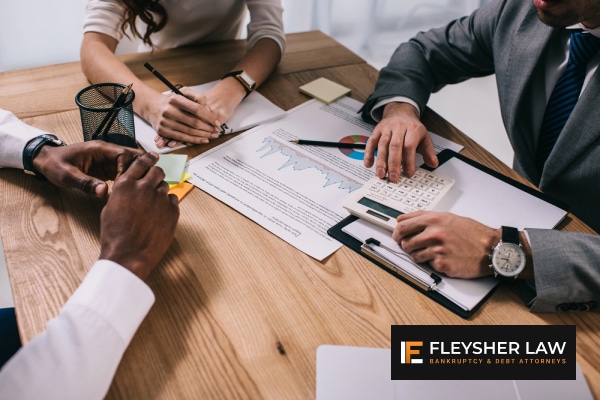This page was written, edited, reviewed & approved by Emil J. Fleysher following our comprehensive editorial guidelines. Emil J. Fleysher, the Founding Partner, has 15+ years of legal experience as a bankruptcy attorney. Our last modified date shows when this page was last reviewed.

Filing for bankruptcy offers a way to deal with overwhelming debt. Many people face challenges with medical bills, credit card debt, and personal loans. The bankruptcy process helps individuals find a fresh start.
Fleysher Law Bankruptcy & Debt Attorneys can guide you through this process. Our law firm focuses on helping people achieve debt relief. We handle everything from bankruptcy paperwork to representing clients in bankruptcy court. Filing for bankruptcy under Florida bankruptcy law can feel overwhelming.
That’s why working with an experienced bankruptcy attorney can make a difference. We assist clients in the Middle District of Florida with every step of their bankruptcy case.
Choosing the right type of bankruptcy is crucial. Most individuals file under Chapter 7 or Chapter 13. Each has its benefits, depending on your financial situation.
Chapter 7 bankruptcy eliminates unsecured debts like credit card debt or medical bills. However, passing the means test is required. This test measures your income against the federal poverty guidelines. If your income falls below the required level, you qualify for Chapter 7.
Chapter 13 bankruptcy helps if you earn more or want to keep certain assets. It creates a repayment plan for three to five years. This option is good for catching up on missed mortgage payments.
Fleysher Law Bankruptcy & Debt Attorneys help you choose what fits your needs. Our seasoned bankruptcy attorneys understand Florida bankruptcy laws and can guide you.

Collect essential financial records such as tax returns, bank statements, pay stubs, and any documentation related to your assets or debts. These documents will be used to complete your bankruptcy paperwork accurately and provide a clear picture of your financial situation.
Federal law requires that you take a credit counseling course within 180 days before filing. This course provides insights into managing finances and explores possible alternatives to bankruptcy. Upon completion, you will receive a certificate required for filing.
Speak with a skilled and competent bankruptcy attorney to assess your financial situation and determine the best course of action. An expert and skilled attorney will help you understand your rights, responsibilities, and the specific requirements in your district to ensure your case is handled correctly.
Filing for bankruptcy requires specific documents to provide a clear picture of your financial situation. These include tax returns, proof of income, identification, and details about assets like vehicles or real estate. Properly gathering these documents is essential for a smooth process.
Documents you must not forget include:
Tax returns are critical for any bankruptcy filing. They provide the court and the bankruptcy trustee with a detailed view of your financial history. You will need to submit federal and state tax returns for at least the past two years. These documents verify your income and help assess your eligibility for bankruptcy.
If you are self-employed, additional documents, such as profit-and-loss statements, may be required. These support the information provided in your tax returns and give a fuller picture of your financial status. Having accurate and complete tax records is essential to avoid delays or issues in your bankruptcy case.
Income documentation is a key component of any bankruptcy filing. It proves your earnings and helps determine your eligibility for Chapter 13 bankruptcy or Chapter 7 bankruptcy.
These records typically include recent pay stubs from the past six months. If you’re self-employed, you may need to provide profit-and-loss statements or other evidence of income.
The court and the bankruptcy trustee use this information to assess whether you qualify for a Chapter 7 discharge under the means test. For Chapter 13, it helps calculate your repayment plan. Accurate documentation ensures a smoother process and avoids delays.
If you receive other income sources, such as rental income, pensions, or government benefits, those should also be included. By thoroughly compiling all income-related documents, you provide a transparent picture of your financial situation. Fleysher Law Bankruptcy & Debt Attorneys can guide you in organizing these records for your case.
Proper identification is essential when filing for bankruptcy. You are required to provide a government-issued photo ID, such as a driver’s license or passport, and your Social Security card. These documents confirm your identity and ensure that the bankruptcy court and trustee are processing the correct case.
You must present these identification documents during the 341 meeting of creditors. Without them, the meeting may be delayed, which could stall your bankruptcy process. Ensuring these are valid and up-to-date is vital for avoiding unnecessary complications.
If you have misplaced your Social Security card or ID, request replacements as soon as possible. You must have these ready before filing to prevent any hold-ups.
We assist clients in preparing all required identification and ensure compliance with legal requirements throughout the bankruptcy process, providing peace of mind during this challenging time.
If you own a vehicle, providing the correct documentation is an essential step in the bankruptcy process. You will need to submit a copy of your vehicle registration to confirm ownership.
In addition, you must include proof of the vehicle’s fair market value, which can be obtained through appraisal reports, Kelley Blue Book estimates, or comparable valuations.
The court also requires evidence that the vehicle is insured. Your insurance documents should confirm the policy is active and meets state requirements. These records help the bankruptcy trustee determine whether your vehicle qualifies as an exempt asset under Florida bankruptcy law.
If you have a loan on your vehicle, include details about the lienholder and the remaining balance. Accurate documentation ensures your case proceeds smoothly without unnecessary delays.
If you own a home or other real estate, you need to provide certain documents. First, you must show the fair market value of the property. This can be done with appraisals, real estate market analyses, or online property value estimates. These documents help the court determine how much your property is worth.
You also need to provide recent mortgage statements. These statements show the current loan balance, monthly payment amounts, and any overdue payments. If you have a second mortgage or a home equity loan, include those statements too.
These records help the bankruptcy trustee decide how your property fits into the case. If the value is high, the trustee will check whether it’s protected by exemptions.
You must also provide statements for your retirement and bank accounts. These documents show the money you have saved and any recent transactions. For bank accounts, include statements from the last three to six months. This helps the court see your current financial situation.
Retirement account statements, such as 401(k) or IRA documents, are also important. Most retirement funds are protected in bankruptcy, but you still need to show proof of their existence and balances.
If you’ve moved money between accounts recently, explain why and provide proof. The trustee will review these to ensure no unusual activity occurred before filing.
Filing for bankruptcy requires filling out specific forms. These include a bankruptcy petition, schedules listing your assets and debts, and other required paperwork. Local forms may also be needed depending on the Middle District of Florida’s rules.
Completing these forms requires accuracy. Mistakes can delay the case or lead to dismissal. Each form must reflect your financial situation honestly and completely. Working with an attorney ensures everything is done correctly.
Once completed, these forms are filed with the bankruptcy court. Fleysher Law Bankruptcy & Debt Attorneys will prepare and file these documents on your behalf. We ensure every form meets legal standards and is submitted on time, making the process smooth and stress-free.

The 341 meeting of creditors is a required step in the bankruptcy process. It is an informal meeting where the bankruptcy trustee reviews your case and asks questions about your finances. Creditors may attend, but most often, they do not.
You must bring your identification, including a government-issued photo ID and your Social Security card. Be prepared to answer questions about your income, expenses, assets, and debts. These questions ensure your bankruptcy forms are accurate and complete.
This meeting is not held in a courtroom; no judge is present. It is typically conducted remotely via Zoom and lasts only a few minutes if all is in order with your case and documents. Your attorney will be there to guide you and provide support.
Fleysher Law Bankruptcy & Debt Attorneys prepare clients for this meeting, ensuring you are aware of what to expect. We ensure all necessary paperwork is ready so the process goes as smoothly as possible.
After filing for bankruptcy, you have to complete a financial management course. This is required to receive a discharge of your debts. The course teaches you how to budget, manage money, and avoid future financial problems. It is the final educational step in the bankruptcy process.
You can complete the course online or in person. You will receive a certificate of completion once it is done. This certificate must be filed with the bankruptcy court to finalize your case. Without it, you cannot get your debts discharged.
The course typically takes a few hours and is simple to complete. It provides helpful tools and tips for managing your finances better in the future.

Yes, there is a filing fee for bankruptcy. For Chapter 7 bankruptcy, the fee is lower than Chapter 13. If you cannot afford the fee upfront, you may request a payment plan or apply for a fee waiver. Approval for these options depends on your income and financial situation.
Chapter 7 fees typically cover court costs and administrative expenses. Chapter 13 fees include a portion for the trustee managing your repayment plan. It’s important to budget for these costs when preparing for bankruptcy.
Fleysher Law Bankruptcy & Debt Attorneys help you understand all fees involved. We also guide you in requesting a waiver or payment plan if you qualify. Our goal is to make the process as affordable and stress-free as possible while ensuring compliance with all legal requirements.
Do I need a bankruptcy lawyer to file for bankruptcy?
While you can file without one, a bankruptcy lawyer ensures the entire process is done correctly. They help you avoid mistakes and ensure compliance with Florida bankruptcy laws.
How can Florida bankruptcy lawyers help with my case?
Florida bankruptcy lawyers guide you through every step, from filing paperwork to representing you in court. Their expertise makes the process smoother and less stressful.
Will my attorney-client relationship remain confidential?
Yes, your attorney-client relationship is protected by law. All information you share with your bankruptcy lawyer is kept private and used only to assist your case.
How long does the entire process take?
The timeline varies. Chapter 7 bankruptcy usually takes 3-6 months, while Chapter 13 can last 3-5 years. Your lawyer will explain the specifics based on your case.
Can a lawyer handle the paperwork for me?
Yes, your bankruptcy lawyer prepares and files all pertinent documents, ensuring they are accurate and meet legal requirements. This reduces errors and delays.
Hiring an experienced attorney can make all the difference in your bankruptcy case. Our team at Fleysher Law Bankruptcy & Debt Attorneys specializes in guiding clients through every step of the process. We analyze your financial situation, compare it to the median income in Florida, and determine your eligibility for Chapter 7 or Chapter 13 bankruptcy.
A reliable attorney ensures all paperwork is completed accurately and filed on time. We handle interactions with the bankruptcy trustee, creditors, and the court, giving you peace of mind. If your income exceeds the median, we explore options such as Chapter 13 repayment plans tailored to your needs.
Our goal is to make the process as smooth as possible while protecting your rights. With personalized advice and support, we work to help you achieve a fresh financial start. Trust our knowledge and experience to lead you toward debt relief.

If you are struggling with debt, Fleysher Law Bankruptcy & Debt Attorneys can help you take control of your financial affairs. We offer devoted legal services to guide you through every step of the bankruptcy process. Our expert team will provide the support you need whether you’re filing under Chapter 7 or Chapter 13.
Bankruptcy is not just about addressing current debt; it’s about securing your financial future. Our attorneys work with you to create a clear plan for moving forward, free from overwhelming debt. We ensure all documents are accurate and meet the legal requirements of the bankruptcy court.
Contact our office today for a consultation. Let us help you understand your options and take the first step toward financial stability. With our comprehensive legal services, you can begin rebuilding your financial future with confidence and peace of mind.

Emil specializes in consumer bankruptcy, debt settlement, and mortgage modification, offering a holistic approach to solving mortgage and debt problems. Emil listens to clients, understands their circumstances and goals, and helps them make the right choices by presenting all options and contingencies.
He is dedicated to helping South Floridians regain their financial freedom from overwhelming debt caused by high interest credit cards, bad mortgage loans, and uninsured medical expenses.

"*" indicates required fields